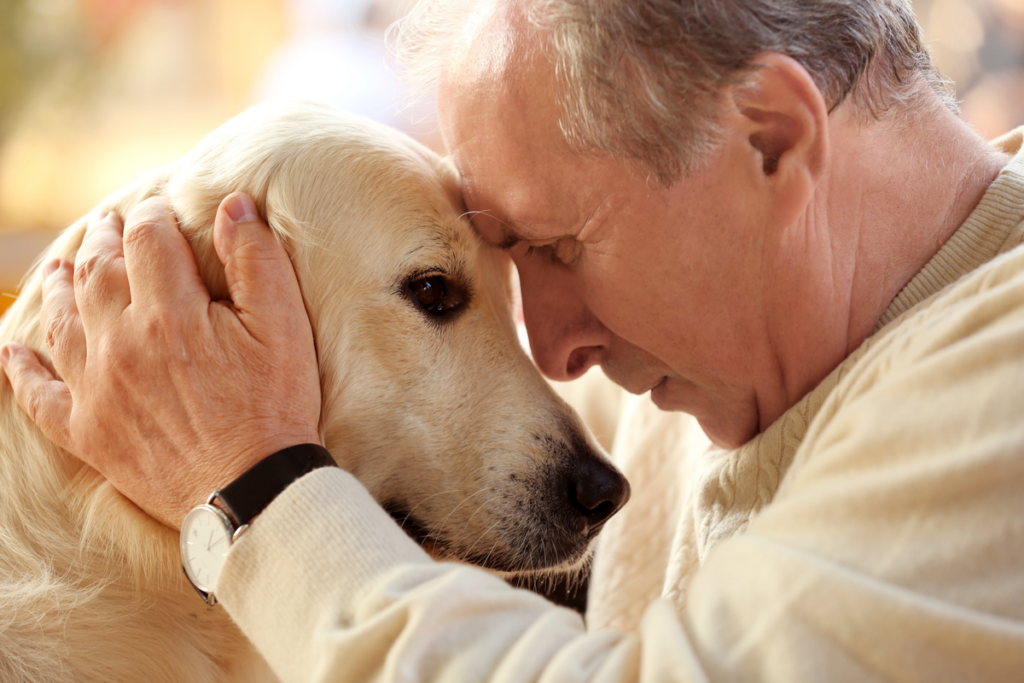I Prefer Talking to My Pet Than to Other People


Written and verified by the psychologist Valeria Sabater
If you share your life with one or more animals you adore, no doubt you’ll have had this thought on more than one occasion. It doesn’t make you feel guilty in the slightest. However, some consider it disconcerting to see someone talking to their dog or cat.
In reality, you don’t have conversations with your furry friends, of course. What you do is interact with them in a particular way. You use phrases and short questions, as well as funny compliments and affectionate comments. This conversational dynamic is as beneficial for the animals themselves as it is for you.
When a pet becomes a member of your family, you need to verbalize your love for them. Therefore, it’s perfectly normal and even necessary to communicate with them. In fact, beyond what some may believe, they understand you. What’s even more fascinating is that they often respond.
We talk to our pets as if they were babies. It’s an innate instinct that favors our bond with them and also brings us great psychological benefits.

Why do you prefer talking to your pet than to people?
Although your pets often don’t understand what you say, they respond to you. They do so by tilting their heads, looking at you with their expressive eyes, or making a sound. In fact, the simple act of listening to you, being present, and providing you with some kind of non-verbal response is really rewarding.
If you prefer talking to your pet, it’s probably because you find the world of human relationships excessively complex. Perhaps you often experience communication problems and relational dynamics. These lead to disappointment or stress. Therefore, it’s more pleasant to talk with your cat than with your boss who always yells back at you.
It’s also more rewarding for you to tell your pets how much you love them than to spend the day with narcissistic relatives who’ve never paid you much attention. Indeed, the human world is often chaotic. On the other hand, that of your pets is extremely basic. They only need your affection, attention, and company and for you to play with them occasionally. This means that your relationship with your pets has certain unique characteristics that are well worth looking at.
Animals aren’t pets, they’re part of our social group
The University of Vienna conducted a study on the bonding of dogs with people. It concluded that the life of humans and animals is somewhat intertwined. Dogs are the species that have been domesticated for the longest time thus sharing their lives with us. Consequently, the ties we build with them are really strong and the complicity that we generate with them can be extremely intense.
Communication with dogs is key to educating them, establishing healthy power relationships, and facilitating coexistence. There’s nothing negative or objectionable about talking to them. In fact, it’s necessary because they are, after all, one more member of the family unit. They’re friends and colleagues who become our daily allies.
Dogs need us to communicate with them. Understanding orders and receiving reinforcements at all times facilitates our coexistence.
Speaking emotionally with animals is an enriching experience
When you claim that you prefer talking to your pet to other people you don’t necessarily mean that your dialogue with your pet is particularly deep and enlightening. In effect, what you achieve is a positive, nurturing, and emotional interaction.
The way you talk to your pet is really similar to the way you talk to young children. You tend to use short sentences and a higher tone. In addition, you articulate the words slowly and use, in general, almost always the same expressions with them. For instance, “Who’s the most handsome cat in the world? Who’s the smartest dog? Do you know how much your mom and dad love you?”
You also carry out other types of communication with them. You think out loud, throwing arguments into the air when they’re next to you, saying things like. “I’ve had enough for today, I’m closing the computer and I’m not doing anything else” or “Let’s see what today brings”. Clearly, your pets don’t understand these comments, but they respond to you with their eyes. They listen to you and are there, by your side.
The fact that our pets are our friends is a gift and something that benefits us mentally.

I prefer to talk to my pet because they don’t judge me
Nicholas Epley is a behavioral scientist and author of the book Mindwise: Why We Misunderstand What Others Think, Believe, Feel, and Want. In this book, he explains that talking to any kind of animal is a sign of intelligence. It’s because it takes effort to recognize the presence of a conscience in another living being. It’s also an act of empathy.
In addition, when you communicate daily with your pets, you’re putting into practice the theory of mind. In other words, you’re trying to understand their alien mental universe, their thoughts, and their intentions. Indeed, those of us who have pets know that they feel, understand, and get emotional, almost like us.
Finally, if we often prefer talking to our pets, it’s because they don’t judge us. They’re emotional validators, who exhibit pure love and acceptance. Indeed, our four-legged friends (also feathered) are our daily refuge. They’re figures that only expect to receive affection and don’t need to speak to show us how much they love us.
If you share your life with one or more animals you adore, no doubt you’ll have had this thought on more than one occasion. It doesn’t make you feel guilty in the slightest. However, some consider it disconcerting to see someone talking to their dog or cat.
In reality, you don’t have conversations with your furry friends, of course. What you do is interact with them in a particular way. You use phrases and short questions, as well as funny compliments and affectionate comments. This conversational dynamic is as beneficial for the animals themselves as it is for you.
When a pet becomes a member of your family, you need to verbalize your love for them. Therefore, it’s perfectly normal and even necessary to communicate with them. In fact, beyond what some may believe, they understand you. What’s even more fascinating is that they often respond.
We talk to our pets as if they were babies. It’s an innate instinct that favors our bond with them and also brings us great psychological benefits.

Why do you prefer talking to your pet than to people?
Although your pets often don’t understand what you say, they respond to you. They do so by tilting their heads, looking at you with their expressive eyes, or making a sound. In fact, the simple act of listening to you, being present, and providing you with some kind of non-verbal response is really rewarding.
If you prefer talking to your pet, it’s probably because you find the world of human relationships excessively complex. Perhaps you often experience communication problems and relational dynamics. These lead to disappointment or stress. Therefore, it’s more pleasant to talk with your cat than with your boss who always yells back at you.
It’s also more rewarding for you to tell your pets how much you love them than to spend the day with narcissistic relatives who’ve never paid you much attention. Indeed, the human world is often chaotic. On the other hand, that of your pets is extremely basic. They only need your affection, attention, and company and for you to play with them occasionally. This means that your relationship with your pets has certain unique characteristics that are well worth looking at.
Animals aren’t pets, they’re part of our social group
The University of Vienna conducted a study on the bonding of dogs with people. It concluded that the life of humans and animals is somewhat intertwined. Dogs are the species that have been domesticated for the longest time thus sharing their lives with us. Consequently, the ties we build with them are really strong and the complicity that we generate with them can be extremely intense.
Communication with dogs is key to educating them, establishing healthy power relationships, and facilitating coexistence. There’s nothing negative or objectionable about talking to them. In fact, it’s necessary because they are, after all, one more member of the family unit. They’re friends and colleagues who become our daily allies.
Dogs need us to communicate with them. Understanding orders and receiving reinforcements at all times facilitates our coexistence.
Speaking emotionally with animals is an enriching experience
When you claim that you prefer talking to your pet to other people you don’t necessarily mean that your dialogue with your pet is particularly deep and enlightening. In effect, what you achieve is a positive, nurturing, and emotional interaction.
The way you talk to your pet is really similar to the way you talk to young children. You tend to use short sentences and a higher tone. In addition, you articulate the words slowly and use, in general, almost always the same expressions with them. For instance, “Who’s the most handsome cat in the world? Who’s the smartest dog? Do you know how much your mom and dad love you?”
You also carry out other types of communication with them. You think out loud, throwing arguments into the air when they’re next to you, saying things like. “I’ve had enough for today, I’m closing the computer and I’m not doing anything else” or “Let’s see what today brings”. Clearly, your pets don’t understand these comments, but they respond to you with their eyes. They listen to you and are there, by your side.
The fact that our pets are our friends is a gift and something that benefits us mentally.

I prefer to talk to my pet because they don’t judge me
Nicholas Epley is a behavioral scientist and author of the book Mindwise: Why We Misunderstand What Others Think, Believe, Feel, and Want. In this book, he explains that talking to any kind of animal is a sign of intelligence. It’s because it takes effort to recognize the presence of a conscience in another living being. It’s also an act of empathy.
In addition, when you communicate daily with your pets, you’re putting into practice the theory of mind. In other words, you’re trying to understand their alien mental universe, their thoughts, and their intentions. Indeed, those of us who have pets know that they feel, understand, and get emotional, almost like us.
Finally, if we often prefer talking to our pets, it’s because they don’t judge us. They’re emotional validators, who exhibit pure love and acceptance. Indeed, our four-legged friends (also feathered) are our daily refuge. They’re figures that only expect to receive affection and don’t need to speak to show us how much they love us.
All cited sources were thoroughly reviewed by our team to ensure their quality, reliability, currency, and validity. The bibliography of this article was considered reliable and of academic or scientific accuracy.
- Benz-Schwarzburg, J., Monsó, S., & Huber, L. (2020). How Dogs Perceive Humans and How Humans Should Treat Their Pet Dogs: Linking Cognition With Ethics. Frontiers in psychology, 11, 584037. https://doi.org/10.3389/fpsyg.2020.584037
- Koyasu, H., Kikusui, T., Takagi, S., & Nagasawa, M. (2020). The Gaze Communications Between Dogs/Cats and Humans: Recent Research Review and Future Directions. Frontiers in psychology, 11, 613512. https://doi.org/10.3389/fpsyg.2020.613512
This text is provided for informational purposes only and does not replace consultation with a professional. If in doubt, consult your specialist.







